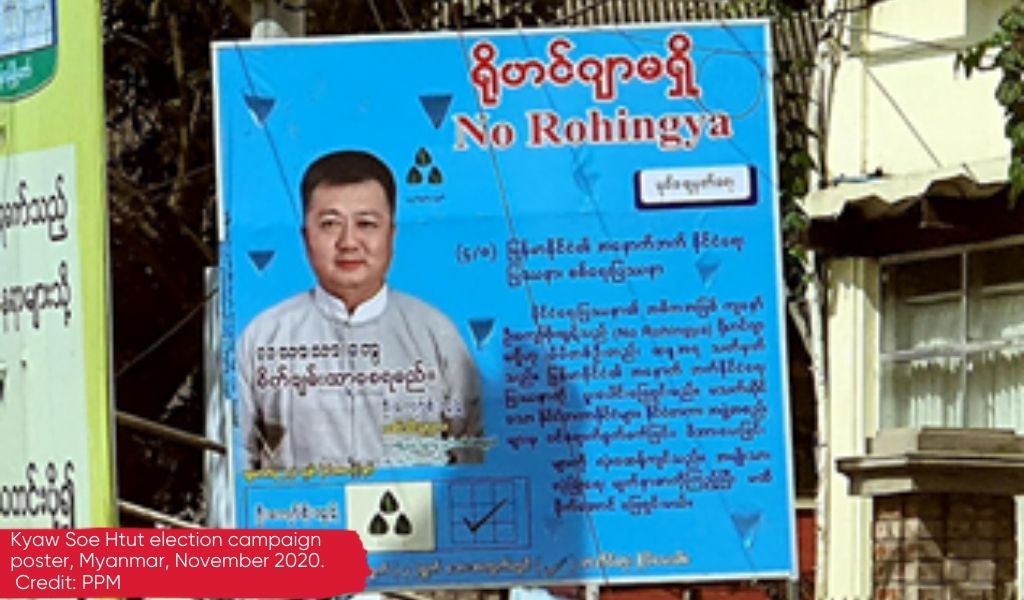Earlier this week, Myanmar celebrated the 72nd anniversary of its independence from British rule, but this period has been mired by ongoing conflict amongst its hugely diverse ethnic and religious groups. In recent years, inter-ethnic tension has taken on online dimension with hate speech and fake news rapidly spreading through social media. The IDS-led CREID programme found that hate speech spiked ahead of Myanmar’s recent national election, despite race and religion-based campaigning being prohibited under electoral regulations.

October 16, Min Aung Mon election campaign photo. Credit. PPM
Last November, Aung San Suu Kyi’s National League for Democracy party swept back into power, contrary to predictions of a lower turnout due to Covid-19 and opposition parties capitalising on broken promises. This victory was not without its issues – opposition parties contested the results, significant groups of people in the country were disenfranchised and denied the vote (for example, the Rohingya) whilst the run-up to the election was mired by hate speech.
Myanmar was already notorious for how Facebook was used to influence and mobilise people against the Rohingya people in events that led up to mass killings and the displacement of over half a million people across the border and into Bangladesh. It is known that electoral campaign periods can be associated with spikes of hate speech as tension and competition ratchet up in the lead up to polling day. All eyes were therefore on Myanmar during the months of October and November to see whether any lessons had been learnt from the tragic events of recent years.
CREID supported local rights NGO, Peace Point Myanmar (PPM), to monitor hate speech used on and offline by candidates and political parties during the election period, the results of which were published here (also available in Burmese here). PPM also recorded the promises made by different candidates and parties on the campaign trail that are relevant to human and minority rights.
Hate speech was spread by party supporters as well as the political parties themselves
PPM found that very few parties and candidates promised to work for minorities, their concerns and their challenges. In fact, race and religious-based hate speech was used in campaign strategies by some political parties during the general elections. A notable change from the past, which was found during this research, was that most candidates did not use hate speech when targeting their online audience on official party platforms. Instead, those who did use it preferred to do so using their own personal social media or during offline campaign events in rural areas.
A lot of the online incitement to religious or racial hatred was spread by supporters and not by candidates themselves. PPM’s explanation for this disturbing trend was that supporters were intentionally assigned by parties to create private Facebook groups with thousands of members to spread messages in ways that are much more difficult to monitor. In these private online spaces, hate speech targeting Muslim candidates, Rohingya Muslims and Myanmar Muslims was especially prevalent. PPM’s report found that 36 per cent of incitement to religious or racial hatred led back to party supporters.
Nevertheless, hate speech was also used by political parties, like the Union Democratic Party (UDP), which used it in 12 per cent of its communications. The People Pioneer Party (PPP) made use of hate speech in 9 per cent of its communications, and the Union Solidarity and Development Party (USDP) in 6 per cent. Evidence in the report shows hate speech ranging from individual statements, e.g. “All Muslims must not get the same rights as other citizens […]” (PPP, Daw Thet Thet Khine) to singling out candidates of a particular religion (Muslim) and discouraging voting for them on that basis (UDP).
Although race and religion-based campaigning is prohibited under electoral regulations, no legal action has been taken against candidates or party supporters for hate speech to this day.
